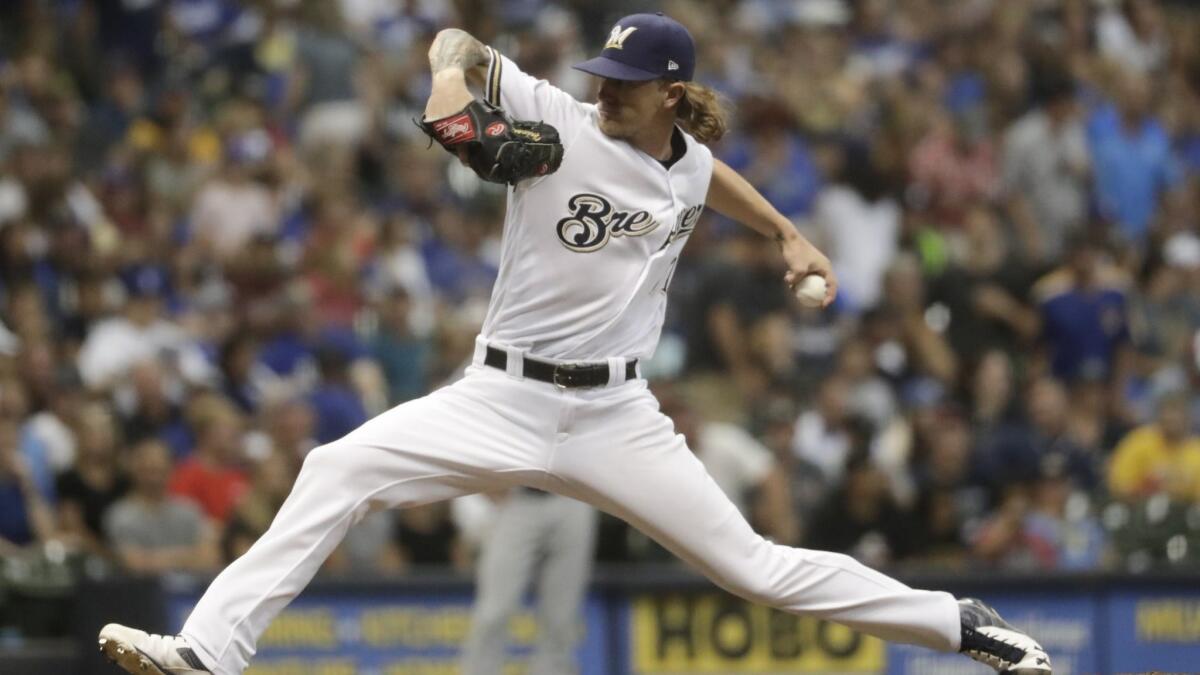Column: Brewers fans quickly forgave Josh Hader for awful tweets. But were they too forgiving?
- Share via
Reporting from Milwaukee — Say an athlete posts messages on social media containing racist, homophobic and misogynistic language as a teenager and the messages later surface. Say the athlete is a key player on a beloved Los Angeles institution. And say the athlete apologizes profusely, crying as he explains that he isn’t the same person who posted the offensive messages.
Here’s a request to the fans of Los Angeles: When the athlete returns to the field, don’t do what the fans at Miller Park did when Josh Hader scaled the mound Saturday night.
Hader was making his first appearance since the All-Star game, when a series of objectionable tweets he wrote as a 17-year-old started circulating on social media.
With the Brewers leading the Dodgers 4-2 in the top of the seventh inning, Hader’s name was called over the stadium’s public address system.
The crowd roared. Some fans stood. Others followed. Then even more.
Oh, boy. A standing ovation.
“It means a lot,” Hader said, “having the Milwaukee support and just knowing they know my true character and just forgive me for my past because it’s not who I am today.”
And that was almost certainly the message the announced crowd of 36,242 fans wanted to send to Hader. The message they sent to the other parts of the country was less clear.
Why was he deserving of a standing ovation?
Granted, by all accounts, Hader is extremely likable. His minority teammates immediately came to his defense and argued he wasn’t a racist. He apologized to the team before the series opener against the Dodgers on Friday, and cried as he did so. He later apologized to the public in a pregame news conference, at which the other Brewers players literally stood behind him.
It should also be pointed out that the majority of the offensive messages were quoting lines from rap songs or movies. The opinion here is that non-Blacks should never use the n-word under any circumstance, but directly quoting a rap lyric that contains the epithet could be an act of ignorance instead of malice.
The more egregious tweets pertained to homosexuals, including one that read, “I hate gay people.”

Shortly after the messages were unearthed, the commissioner’s office ordered Hader to undergo sensitivity training and participate in Major League Baseball’s diversity and inclusion initiatives. He agreed.
The decision to not suspend Hader reflected MLB’s belief that he shouldn’t be punished for the stupidity of his youth and that was he really wasn’t the same person who posted the messages.
Fine. But did the fans really have to give him a standing ovation?
“It’s the support of the home team, the home player,” Dodgers manager Dave Roberts said. “Obviously he addressed the team and felt very remorseful. I didn’t hear what he said. I know the organization, the players, the coaches are there to support him. Obviously, he’s remorseful. The fan base was here to support him. That’s what I saw.”
The fans could have communicated that to him without rising to their feet. A warm applause would have been enough. Watching and listening to the over-the-top support of Hader, it was only natural to wonder if something else was at play.
The most charitable view was that they wanted to back a player whose life was turned upside down over the last few days. But Hader was responsible for the ordeal. He wasn’t a victim and didn’t ask to be treated like one.
Or was it something more sinister? Were the fans taking a tone-deaf stand against political correctness? Worse, were they supporting the discriminatory messages?
The same questions had to be asked in the World Series after Yuli Gurriel made a slanted-eye gesture on the Houston Astros bench after hitting a home run off Dodgers right-hander Yu Darvish, who is from Japan.
In this column space, I asked readers to temper their reactions toward Gurriel, citing how racially charged language and gestures aren’t made with the same level of malice in Latin America as they are in the United States. But even I was taken aback in the next game when Gurriel received a standing ovation from his home fans. What did he do to deserve this? Or were they applauding some misguided form of free speech?
In both Gurriel’s and Hader’s cases, maybe this really was about backing the local baseball team and nothing more. It didn’t matter. The doubts did damage. Houston looked small on that night of the World Series, just as Milwaukee looked small on Saturday night.
Sports are supposed to unify people. Reactions like this, whatever the intention, threaten to divide.
Follow Dylan Hernandez on Twitter @dylanohernandez
More to Read
Are you a true-blue fan?
Get our Dodgers Dugout newsletter for insights, news and much more.
You may occasionally receive promotional content from the Los Angeles Times.










